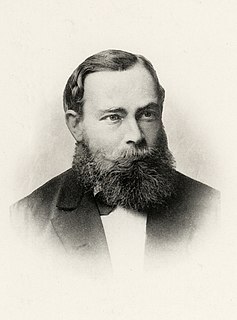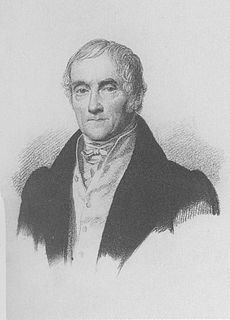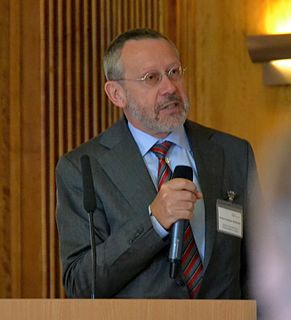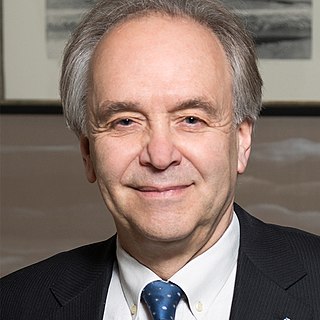Related Research Articles

Friedrich Ludwig Gottlob Frege was a German philosopher, logician, and mathematician. He worked as a mathematics professor at the University of Jena, and is understood by many to be the father of analytic philosophy, concentrating on the philosophy of language, logic, and mathematics. Though he was largely ignored during his lifetime, Giuseppe Peano (1858–1932), Bertrand Russell (1872–1970), and, to some extent, Ludwig Wittgenstein (1889–1951) introduced his work to later generations of philosophers. In the early 21st century, Frege was widely considered to be the greatest logician since Aristotle, and one of the most profound philosophers of mathematics ever.

Thomas Metzinger is a German philosopher and professor of theoretical philosophy at the Johannes Gutenberg University of Mainz. As of 2011, he is an Adjunct Fellow at the Frankfurt Institute for Advanced Studies, a co-founder of the German Effective Altruism Foundation, president of the Barbara Wengeler Foundation, and on the advisory board of the Giordano Bruno Foundation. From 2008 to 2009 he served as a Fellow at the Berlin Institute for Advanced Study; from 2014 to 2019 he was a Fellow at the Gutenberg Research College; from 2019 to 2021 he was awarded a Senior-Forschungsprofessur by the Ministry of Science, Education and Culture. From 2018 to 2020 Metzinger worked as a member of the European Commission’s High-Level Expert Group on Artificial Intelligence.

Wilhelm Traugott Krug was a German philosopher and writer. He is considered to be part of the Kantian School of logic.
Hugo Albert Emil Hermann Dingler was a German scientist and philosopher.

Karl-Otto Apel was a German philosopher and Professor Emeritus at the University of Frankfurt am Main. He specialized on the philosophy of language and was thus considered a communication theorist. He developed a distinctive philosophical approach which he called "transcendental pragmatics."

Jürgen Mittelstraß is a German philosopher especially interested in the philosophy of science.

Hans Köchler is a retired professor of philosophy at the University of Innsbruck, Austria, and president of the International Progress Organization, a non-governmental organization in consultative status with the United Nations. In his general philosophical outlook he is influenced by Husserl and Heidegger, his legal thinking has been shaped by the approach of Kelsen. Köchler has made contributions to phenomenology and philosophical anthropology and has developed a hermeneutics of trans-cultural understanding that has influenced the discourse on the relations between Islam and the West.
Otfried Höffe is a German philosopher and professor.

Hugo Loetscher was a Swiss writer and essayist.
Wolfgang Stegmüller was a German-Austrian philosopher with important contributions in philosophy of science and in analytic philosophy.
Egbert Richter is a German freelance writer and lecturer, author of self-published treatises on Yoga, Vedanta, Esotericism and mythology, translations of some Upanishads, the Bhagavad Gita and the Yoga Sutras of Patanjali as well as original poetry. In his 1992 decipherment claim of the Indus script, he argues that the script is "based very largely on intuition, and this quality is also required for reading it", likening the process of "decipherment" to meditation, concluding that the Rbhus, who Richter alleges were priests of the Harappan civilization, invented the Indus script under the influence of Sumerian cuneiform. Werner (1999) confesses himself "at a loss how to evaluate" Richter's work, admitting the author has thorough knowledge of the various sources he uses, but at the same time completely lacks academic method, discipline or experience.
Jochen Fahrenberg is a German psychologist in the fields of Personality, psychophysiology and philosophy of science.

Pirmin Stekeler-Weithofer is a German philosopher and professor of theoretical philosophy at the university of Leipzig. He was the president of the international Ludwig Wittgenstein society (2006-2009) and is now a vice-president of this institution.
Matthias Zschokke is a Swiss writer and filmmaker.
Ulrich Steinvorth (born 1941) is a German political philosopher. He earned his doctorate with Günther Patzig in 1967. His dissertation was on private language and sensation in Wittgenstein. He habilitated in 1975 at the University of Mannheim with a thesis that advanced an analytic interpretation of Marx's Dialectic. His primary field of research is political philosophy. Additionally, he has published on topics in moral philosophy and applied philosophy, as well as the history of philosophy and metaphysics. He has also been an active supporter of the German branch of the Creative Commons movement.

Andreas Dorschel is a German philosopher. Since 2002, he has been professor of aesthetics and head of the Institute for Music Aesthetics at the University of the Arts Graz (Austria).

Michael Bordt SJ is a German philosopher and academic. He is a professor at the Munich School of Philosophy and specialized in the area of ancient philosophy, especially Plato and Aristotle. Since 2011 he has been the chair of the Institute of Philosophy and Leadership at Munich.
Otto Pöggeler was a German philosopher. He specialized in phenomenology and commenting on Heidegger. In 1963 he authored the acclaimed Martin Heidegger’s Path of Thinking, one of the first rigorous attempts at tracing the development of Heidegger’s thought. He also published a study of poetry of Paul Celan, and was director of the Hegel-Archiv at the Ruhr University in Bochum.
Rudolph Angermüller is a German musicologist, who rendered great services to Mozart studies in particular.

Klaus Mainzer is a German philosopher and scientist. Mainzer is the president of the European Academy of Sciences and Arts. He is the author of the widely translated, cited, and reviewed book Thinking in Complexity.
References
- ↑ Chisholm, Roderick M. (1985). Philosophie des Geistes, Philosophie der Psychologie. Hölder-Pichler-Tempsky. p. 8. ISBN 978-3-209-00592-2 . Retrieved 4 May 2012.